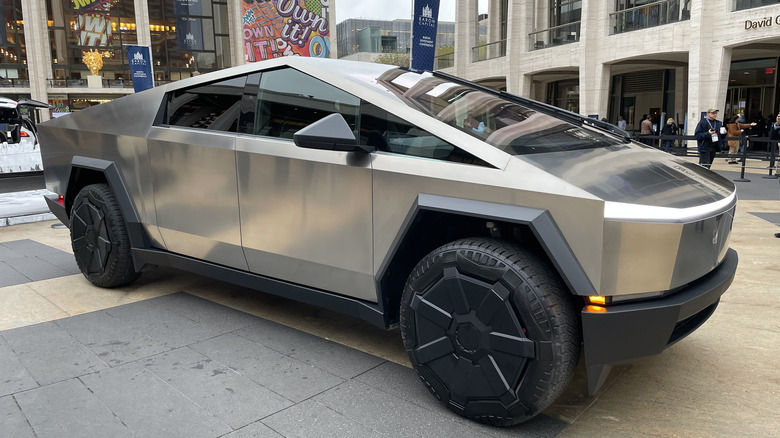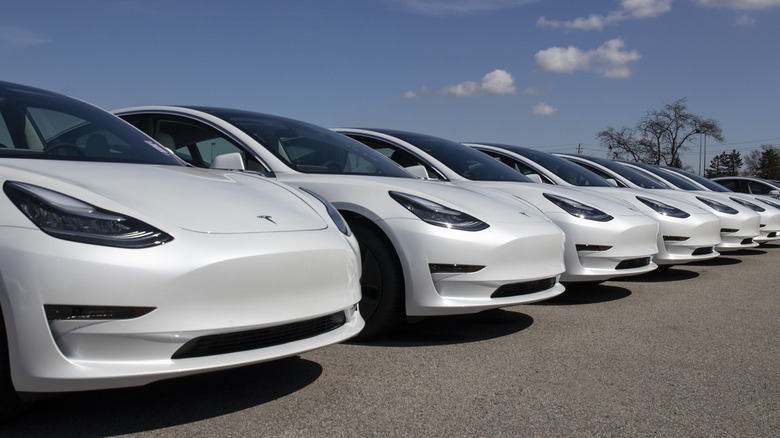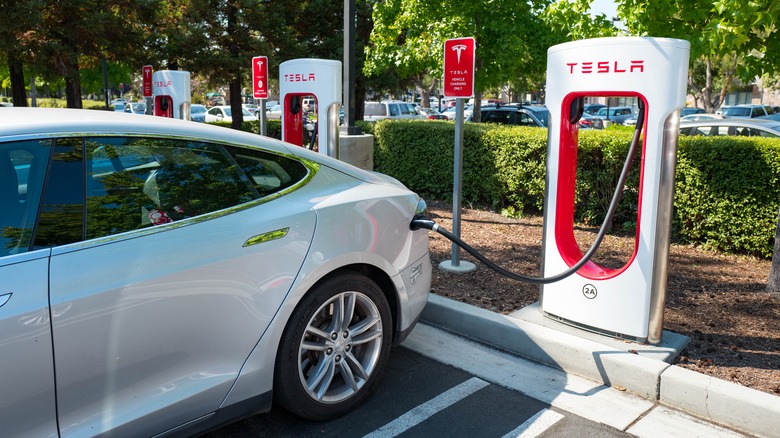Why You Shouldn't Bet Against Tesla, According To An Expert
Between mixed reactions to the Cybertruck's debut and Tesla CEO Elon Musk's actions and behavior constantly making headlines, you might assume that Tesla — the mighty EV startup that single-handedly changed the electric vehicle landscape — may have peaked and is heading downhill. After all, its stock price is down from a year ago and has lost more than half its value since 2021, which is never a great sign for a company.
However, just because the automaker is down doesn't necessarily mean it's out. According to Dr. Laine Mears, Automotive Manufacturing Chair at Clemson University, you shouldn't bet against Tesla, as there's more than one reason it can survive this period and perhaps even thrive once it comes out of it.
"Tesla has deep pockets and a great head start," says Dr. Mears. "They will be subject to increased competition as more original equipment manufacturers (OEMs) roll out new electric vehicles, but look how long that is taking — Tesla will continue to have significant market share and a large following of dedicated fans, so I don't see them going under anytime soon."
Tesla isn't like a traditional automaker akin to the legacy titans that make up the Big Three — Ford, General Motors, and Chrysler (now a subsidiary of Stellantis). While Tesla manufactures cars and trucks as those companies do, the company — which was founded in San Carlos, California in 2003 — is a Silicon Valley startup. Like a lot of tech startups, it's still flush with cash that it can use to endure profit losses and bad press, and continue to invest in its own growth. This first reason provided by Dr. Mears would be enough on its own not to count Tesla out, but the second reason — Tesla's "great head start" — might prove even more advantageous in the long run.
Tesla's competition may not actually want to compete
Tesla has become synonymous with electric vehicles, since it's an automaker that doesn't produce any internal combustion engine (ICE) vehicles, and was the first big company to really be successful with EVs. That, plus its "significant market share" and "following of dedicated fans," creates the head start that Dr. Mears is referring to. However, common wisdom likes to think that once large legacy automakers take EVs seriously, they'd quickly catch up and surpass Tesla precisely because they've dominated the automotive market for over a century.
As Dr. Mears notes, though: "look how long that is taking." Ford sold 9,589 of the Mach-E — its electric Mustang — in the first quarter of 2024, while General Motors sold 5,800 Cadillac Lyriq EVs and 1,668 electric Hummers. In that same period, Tesla sold a total of 386,810 electric vehicles — significantly more than the Big Three combined. Not only that, but legacy automakers seem to be frustrated by slower-than-anticipated EV sales and are cutting back on production rather than increasing it – Ford is reducing how many units of its popular F-150 Lightning it will make.
Up until recently, it looked like the EV market was about to boom once and for all as the world transitioned away from fossil fuels. However, legacy automakers have shown they can be patient, as they can still manufacture and sell plenty of ICE vehicles in the meantime. Tesla doesn't have that option — so it will keep making EVs and only EVs. With its competition currently not all that interested in actually competing for the market share, Tesla still has plenty of room to grow.
Tesla doesn't need other automakers, but many automakers need Tesla
One other reason American car manufacturers are failing to catch up to Tesla, according to Dr. Mears, is the company's supercharger network. One of the biggest hurdles facing EV adoption in the U.S. is the lack of charging stations that allow cars to travel long distances across the country or recharge away from home. As the industry is still relatively new, there is also more than one charging standard — namely the North American Charging Standard (NACS) and the Combined Charging Standard (CCS) — which means that even if there is a charging station in range of your vehicle, your EV may not be compatible with it.
Tesla developed its own efficient, affordable connector, NACS, and invested heavily in infrastructure so that its customers could more easily find charging stations. This is another advantage that has helped Tesla grow, and its NACS technology may even outlive its own vehicles. Tesla shrewdly made its technology open source for other companies, which subsequently helped the global standards authority SAE International in its decision to name NACS its official standard over CCS. After this announcement, several prominent automakers — such as Volkswagen, Porsche, and Audi — proclaimed their EVs would be compatible with NACS, and thus Tesla's supercharger network.
With this in mind, it's clear that Tesla isn't going anywhere anytime soon. Even if, for some reason, the company stopped making EVs or consumers decided to heavily favor more traditional automakers, Tesla's supercharger network and NACS connectors will likely be an important part of the EV landscape for a long time. As Dr. Mears puts it, don't expect Tesla to "[go] under anytime soon."


